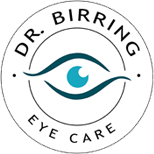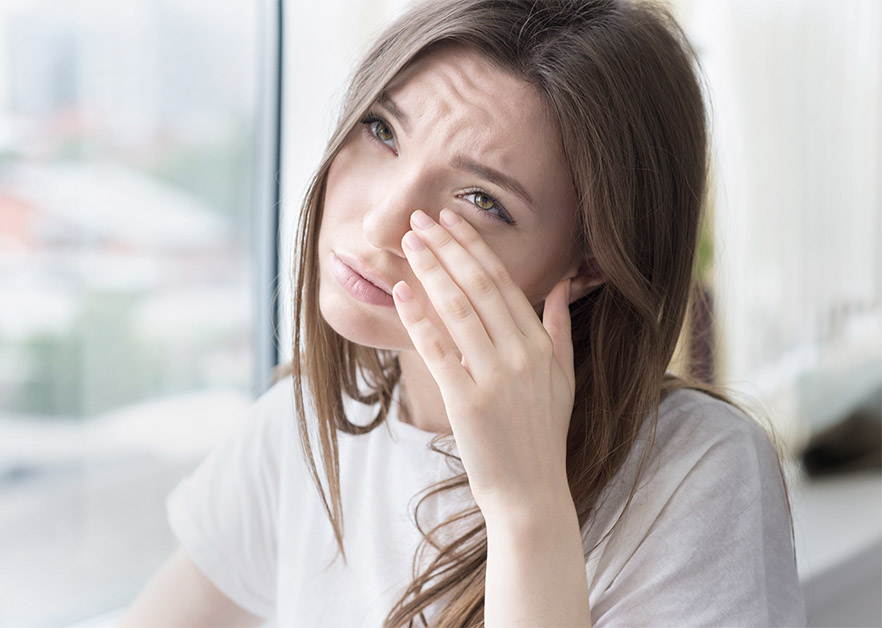Dry eye disease is a condition in which your tears are unable to provide the proper amount of lubrication for your eyes’ surface. If you have dry eyes, it is most likely that you are not producing a large enough quantity of tears, or you are not producing a high enough quality of tears. Inadequate lubrication can lead to inflammation and damage of the eye’s surface, causing them to feel like they are burning or stinging.
If you are unsure if you are being affected by dry eye disease, our eye doctors at Birring Eyecare can provide you with a diagnosis during a comprehensive eye exam — book an appointment with us to take the first step of treating dry eye disease.
How Our Tears Prevent Dry Eye
Tears keep our eyes moist and healthy. If our tears are not doing their job correctly, then our eyes can start to dry out. The tear film is made up of 3 layers in a specific ratio — these 3 layers are an oil layer, an aqueous layer, and a mucus layer.
The oil layer is located on the outside of the tear film. The oil keeps our tears from evaporating too quickly and keeps the surface of our eyes smooth. The oil gets added to the tear film by the meibomian glands on our eyelids.
The aqueous layer, or water layer, resides in the middle of the tear film and makes up the largest part of our tears. This layer helps clean the eye by washing away foreign particles. This layer is created by the lacrimal glands in the eyelids.
The mucus layer is the innermost part of the tear film. Mucus helps spread our tears across our eyes and helps our tears stick to our eyes’ surface. The mucus that is used in our tear film is created in the conjunctiva.
If our tear film does not have the proper balance between these 3 layers, we can start to develop dry eyes due to inadequate lubrication.
What Are the Symptoms of Dry Eye Disease?
Some common symptoms of dry eye disease include:
- Feeling like your eyes are stinging and burning
- Blurred vision
- You have a scratchy or gritty feeling in your eye
- Strings of mucus beginning to form in or around your eyes
- Your eyes look red or feel irritated
- Feeling pain when wearing contact lenses
What Causes Dry Eye Diseases?
Dry eyes are caused by tear film dysfunction. Hormonal changes, autoimmune diseases, and allergies can all contribute to tear film dysfunction. If your eyes cannot produce enough tears, or if your tears evaporate too quickly due to poor quality, the development of dry eyes can be exacerbated.
Decreased tear production usually occurs when your lacrimal glands are unable to produce enough aqueous fluid. Increased tear evaporation is typically influenced by an inadequate amount of oil in your tear film caused by the meibomian glands becoming clogged or blocked.
Some specific causes of dry eye disease are:
- Certain diseases, — rheumatoid arthritis, Sjögren’s syndrome, thyroid disease, lupus
- Blepharitis
- Entropion and ectropion
- Dry, windy, and/or smokey climates
- Not blinking enough
- Using contact lenses for a long time
- Having refractive eye surgery
- Taking certain medicines — diuretics (water pills), beta-blockers, antihistamines, sleeping pills, anxiety medication, antidepressant medications, heartburn medicines
How to Treat Dry Eye Disease
Treating Dry Eyes With Artificial Tears
Artificial tears can be an effective solution for mild cases of dry eye disease. These eye drops aim to replicate the function of your tears and add moisture to the surface of your eyes. You can purchase artificial tears without a prescription, making them one of the most readily available treatment options for dry eyes.
If you are using artificial tears often during a single day, consider using preservative-free tear drops — artificial tear eye drops that contain preservatives can irritate your eyes if they are being used too often in a single day.
Treating Dry Eyes By Blocking Your Tear Ducts
You can prevent your tears from evaporating too quickly by blocking or plugging your tear ducts. Punctal plugs or thermal cautery are two different ways that your eye doctor can plug your tear ducts — punctual plugs are a removable insert, and thermal cautery uses heat to permanently seal your tear ducts.
Treating the Causes of Dry Eye Diseases
If your eyes can produce enough tears on a healthy day but have become irritated for another reason, your eye doctor may recommend:
- Prescription eye drops or ointments
- Warm compresses on the eyes
- Massaging your eyelids
- Certain eyelid cleaners
- Radio frequency for Meibomian Gland dysfunction
How to Prevent Dry Eyes
Some effective methods to prevent dry eyes from developing in the first place are:
- If it is possible, try not to use a hairdryer
- Keep your home at a cool or room temperature
- In the winter, use a humidifier to add moisture to the air in your house
- Wear glasses or goggles outside in cold or dry weather
- Add omega-3 fatty acids to your diet



